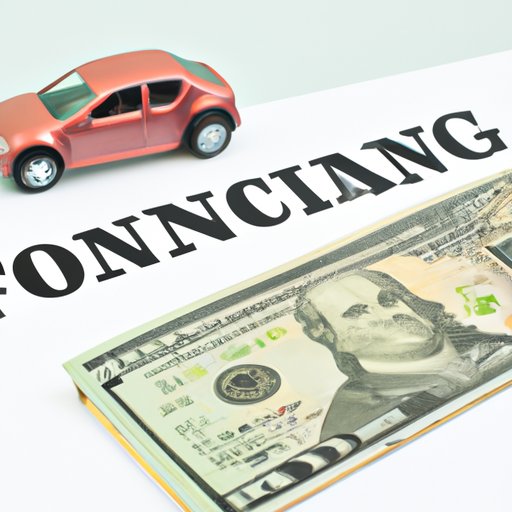Introduction
Refinancing a car loan is when you pay off an existing auto loan with a new loan, typically with more favorable terms. This process can help reduce your monthly payment and overall interest charges. But does refinancing a car loan effect home loans? In this article, we will explore the interconnectedness of refinancing a car loan and home loan, and discuss the steps you should take if you are considering refinancing.

Exploring the Pros and Cons of Refinancing a Car Loan
Before exploring the ways that refinancing a car loan could impact your home loan, it is important to understand the pros and cons of refinancing. Just like any other financial decision, there are potential benefits and drawbacks to consider.
Benefits of Refinancing
The primary benefit of refinancing is the possibility of reducing your monthly payments. If interest rates have dropped since you took out your original loan, you may be able to secure a lower interest rate on your new loan, which can significantly reduce your monthly payments. Additionally, you may also be able to reduce your overall interest charges by shortening the loan term.
Potential Drawbacks to Consider
Refinancing is not always the best option. Before committing to a new loan, it is important to consider the potential drawbacks. For example, if you refinance your loan, you may be charged additional fees, such as application fees, origination fees, and closing costs. Additionally, if you extend the loan term, you may end up paying more in interest over the life of the loan.
How Refinancing Your Car Loan Could Impact Your Home Loan
Now that we’ve explored the pros and cons of refinancing a car loan, let’s take a look at how it could impact your home loan. There are three primary ways that refinancing your car loan could affect your ability to get a home loan: interest rates, equity, and credit score.
Interest Rates
When you refinance your car loan, you may be able to secure a lower interest rate on the new loan. This could have a positive impact on your home loan, as lenders may view you as a lower risk borrower and thus offer you a better rate on your home loan.
Equity
If you have built up equity in your vehicle, refinancing could allow you to tap into that equity and use it for things like a down payment on a home loan. However, it is important to remember that refinancing your car loan could also mean you lose some of your equity, as any remaining balance on the loan after refinancing will still need to be paid off.
Credit Score
Your credit score is one of the most important factors considered when applying for a home loan. Refinancing your car loan can have a positive or negative impact on your credit score, depending on how you handle the loan. If you make your payments on time and keep the loan in good standing, your credit score could improve. However, if you miss payments or default on the loan, it could have a negative impact on your credit score.
Examining the Financial Benefits of Refinancing a Car Loan
In addition to the potential impacts on your home loan, there are several financial benefits to consider when refinancing your car loan. These include lower monthly payments, lower overall interest charges, and the possibility of shortening the loan term.
Lower Monthly Payments
As mentioned previously, one of the primary benefits of refinancing is the potential to reduce your monthly payments. By securing a lower interest rate on the new loan, you can potentially save hundreds of dollars each month. This could free up money in your budget for other expenses, such as a home loan down payment.
Lower Overall Interest Charges
Another financial benefit of refinancing is the potential to reduce your overall interest charges. If you are able to secure a lower interest rate on the new loan, you may end up paying less in interest over the life of the loan. Additionally, if you shorten the loan term, you may also be able to reduce your total interest charges.
Possibility of Shortening the Loan Term
Finally, if you are able to secure a lower interest rate on the new loan, you may be able to shorten the loan term. A shorter loan term means fewer payments and less overall interest charges. However, it is important to remember that a shorter loan term will also mean higher monthly payments.

What You Need to Know Before Refinancing a Car Loan
Before refinancing your car loan, there are several key pieces of information you should know. This includes the current value of the vehicle, the remaining balance on the loan, and the length of time left on the loan.
The Current Value of the Vehicle
It is important to know the current value of the vehicle, as this will determine the amount of the loan you are eligible for. The loan amount will usually be equal to or less than the value of the vehicle, so knowing its value is essential.
The Remaining Balance on the Loan
You should also know the remaining balance on the loan, as this will help you determine whether refinancing is a good option for you. If the remaining balance is too high, you may not be able to secure a lower interest rate on the new loan, and thus refinancing may not be worth it.
The Length of Time Left on the Loan
Finally, you should know the length of time left on the loan. If the loan term is almost finished, it may not be worth refinancing, as you may end up paying more in fees than you would save in interest charges.

Understanding the Interconnectedness of Refinancing a Car Loan and Home Loan
As you can see, refinancing your car loan can have a significant impact on your home loan. It is important to understand the interconnectedness of these two loans and the steps you should take to ensure a smooth refinancing process.
How One Impacts the Other
As discussed above, refinancing your car loan can impact your home loan in several ways, including interest rates, equity, and credit score. It is important to understand how these factors could affect your ability to secure a home loan, and plan accordingly.
Steps to Take for a Smooth Refinancing Process
When refinancing your car loan, it is important to take the necessary steps to ensure a smooth process. This includes gathering the required documents, shopping around for the best rates, and understanding the terms of the new loan. Additionally, it is important to consider the potential impacts on your home loan, and make sure that refinancing is the right decision for you.
Conclusion
In conclusion, refinancing a car loan can have a significant impact on your home loan. While there are potential benefits to consider, such as lower monthly payments and lower overall interest charges, there are also potential drawbacks that you should consider. Additionally, it is important to understand the interconnectedness of these two loans and the steps you should take for a smooth refinancing process. Ultimately, it is important to do your research and make sure that refinancing your car loan is the right decision for you.
(Note: Is this article not meeting your expectations? Do you have knowledge or insights to share? Unlock new opportunities and expand your reach by joining our authors team. Click Registration to join us and share your expertise with our readers.)
